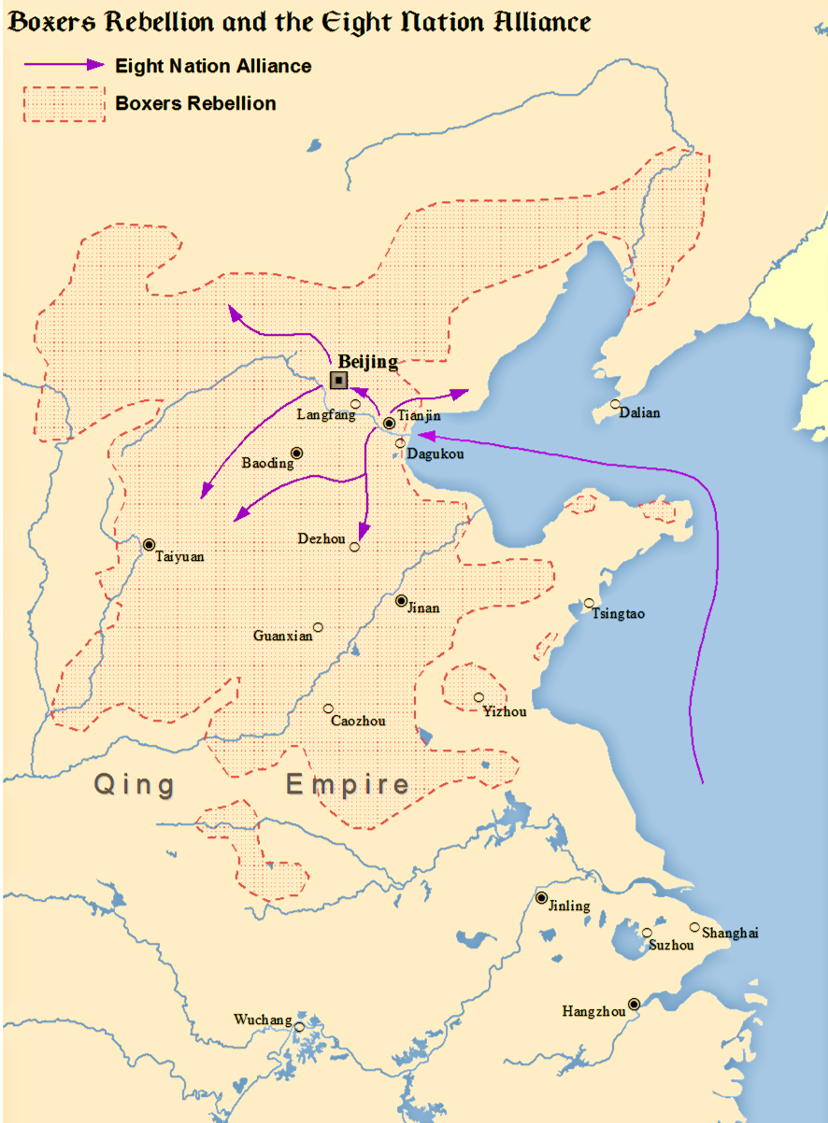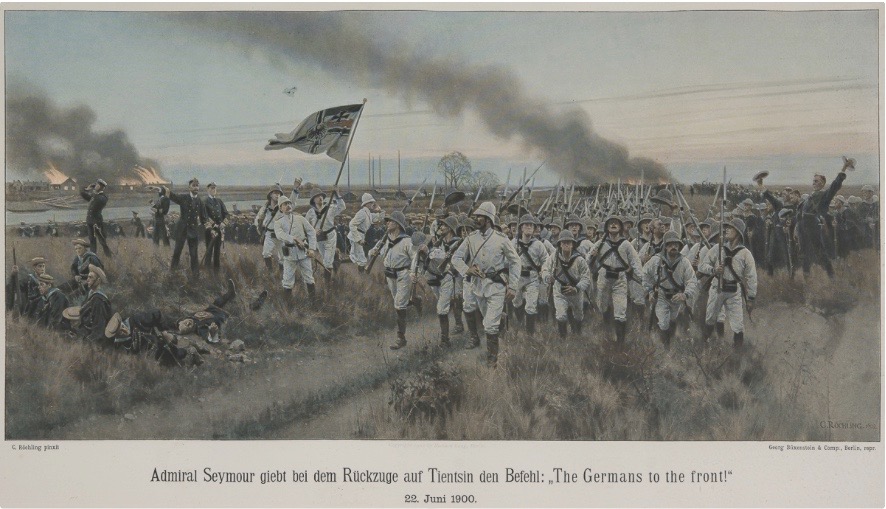|
Ma Fulu
Ma Fulu (Chinese: 马福禄, Pinyin: Mǎ Fúlù, Xiao'erjing: ; 1854 – 1900), a Chinese Muslim, was the son of General Ma Qianling and the brother of Ma Fucai, Ma Fushou and Ma Fuxiang. He was a middle born son. In 1880, Ma Fulu went to Beijing to take advanced military exams when he had an audience before the Emperor. He accidentally committed a faux pas since he did not know proper palace etiquette and subsequently served as a guard for the Emperor to make up for this incident. He studied at a martial arts hall and military school. In 1895, he served under general Dong Fuxiang, leading loyalist Chinese Muslims to crush a revolt by rebel Muslims in the Dungan revolt (1895–1896). His loyalist Muslim troops slaughtered and beheaded the rebel Muslims and his commanding officers received the heads of the rebels from Ma. In 1897, a military Jinshi degree was awarded to Ma Fulu. Ma was transferred along with his brother Ma Fuxiang and several cousins to serve as officers under ... [...More Info...] [...Related Items...] OR: [Wikipedia] [Google] [Baidu] |
Ma Fulu (Peking Opera)
Ma Fulu (1900–1969) was a Peking opera singer known for his "educated clown" roles (, ''wénchǒu''). He served as a mentor to Li Yuru. __NOTOC__ References Citations Bibliography * . External links *马富禄 on Baike.com 1900 births 1969 deaths 20th-century Chinese male actors Chinese male Peking opera actors 20th-century Chinese male singers Singers from Beijing Male actors from Beijing Chou actors {{china-bio-stub ... [...More Info...] [...Related Items...] OR: [Wikipedia] [Google] [Baidu] |
Hundred Days' Reform
The Hundred Days' Reform or Wuxu Reform () was a failed 103-day national, cultural, political, and educational reform movement that occurred from 11 June to 22 September 1898 during the late Qing dynasty. It was undertaken by the young Guangxu Emperor and his reform-minded supporters. Following the issuing of the reformative edicts, a ''coup d'état'' ("The Coup of 1898", Wuxu Coup) was perpetrated by powerful conservative opponents led by Empress Dowager Cixi. Beginning China embarked on an effort to modernize, the Self-Strengthening Movement, following its defeat in the First Opium War, First (1839–1842) and Second Opium War, Second (1856–1860) Opium Wars. The effort concentrated on providing the armed forces with modern weapons, rather than reforming governance or society. The limitations of this approach were exposed by the First Sino-Japanese War (1894–1895) when China was defeated by Meiji (era), Meiji Japan, which had undergone comprehensive reforms during the same ... [...More Info...] [...Related Items...] OR: [Wikipedia] [Google] [Baidu] |
19th-century Chinese People
The 19th (nineteenth) century began on 1 January 1801 ( MDCCCI), and ended on 31 December 1900 ( MCM). The 19th century was the ninth century of the 2nd millennium. The 19th century was characterized by vast social upheaval. Slavery was abolished in much of Europe and the Americas. The First Industrial Revolution, though it began in the late 18th century, expanding beyond its British homeland for the first time during this century, particularly remaking the economies and societies of the Low Countries, the Rhineland, Northern Italy, and the Northeastern United States. A few decades later, the Second Industrial Revolution led to ever more massive urbanization and much higher levels of productivity, profit, and prosperity, a pattern that continued into the 20th century. The Islamic gunpowder empires fell into decline and European imperialism brought much of South Asia, Southeast Asia, and almost all of Africa under colonial rule. It was also marked by the collapse of the large S ... [...More Info...] [...Related Items...] OR: [Wikipedia] [Google] [Baidu] |
Ma Hongkui
Ma Hongkui (, Xiao'erjing: ; March 14, 1892 – January 14, 1970) was a prominent warlord in China during the Republic of China era, ruling the province of Ningxia. His rank was lieutenant general. His courtesy name was Shao-yun (少雲). In 1950, Hongkui migrated to the United States, where he lived until he died in 1970. He was considered by some sources to be among China's best generals. Life Born March 14, 1892, in the village of Hanchiachi, in Linxia County (known as Hezhou), Gansu. The "Who's Who in China" series of books says "Taoho Hsien" (Daohe Xian) is where he was born. His father was Gen. Ma Fuxiang. A Hui, Ma Hongkui graduated from Lanzhou Military Academy (aka Gansu Military Academy) in 1909, and became commander of the Ningxia Modern Army and commander of the 7th Division after the founding of the republic. He was in Beijing until Cao Kun's presidency (1923–24), even though he was the commander of the Ningxia Army. He was at one point the Ningxia, Shaa ... [...More Info...] [...Related Items...] OR: [Wikipedia] [Google] [Baidu] |
Second Sino-Japanese War
The Second Sino-Japanese War (1937–1945) or War of Resistance (Chinese term) was a military conflict that was primarily waged between the Republic of China and the Empire of Japan. The war made up the Chinese theater of the wider Pacific Theater of the Second World War. The beginning of the war is conventionally dated to the Marco Polo Bridge Incident on 7 July 1937, when a dispute between Japanese and Chinese troops in Peking escalated into a full-scale invasion. Some Chinese historians believe that the Japanese invasion of Manchuria on 18 September 1931 marks the start of the war. This full-scale war between the Chinese and the Empire of Japan is often regarded as the beginning of World War II in Asia. China fought Japan with aid from Nazi Germany, the Soviet Union, United Kingdom and the United States. After the Japanese attacks on Malaya and Pearl Harbor in 1941, the war merged with other conflicts which are generally categorized under those conflicts of World War II a ... [...More Info...] [...Related Items...] OR: [Wikipedia] [Google] [Baidu] |
Ma Fuxing
Ma Fuxing (Ma Fu-hsing in Wade Giles; 1864–1924) was a Hui born in Yunnan, in Qing dynasty China. He was an ex-convict. During Yang Zengxin's reign in Xinjiang, Ma was appointed as a military commander, and then Titai of Kashgar. Ma Fuxing served as a general for the Qing dynasty. He joined the Kansu Braves during the Boxer Rebellion, under the command of Gen. Ma Fulu and fought against the foreign forces during the Siege of the International Legations (Boxer Rebellion) and Battle of Peking. After the fall of the Qing dynasty he started working for Yang Zengxin and recruited Dungan troops for him in 1911, and was posted in 1916 to Kashgar. In 1924 Yang intercepted some correspondence between Ma and the Zhili clique and became suspicious. Ma Fuxing was appointed as the commander of 2,000 Hui soldiers by Yang Zengxin. Reign His reign was notorious for its repressiveness and his excesses. He kept a harem of Uighur wives, and a hay cutting machine for severing the limbs of ... [...More Info...] [...Related Items...] OR: [Wikipedia] [Google] [Baidu] |
Ma Hongbin
Ma Hongbin ( zh, 马鸿宾, Xiao'erjing: , September 14, 1884 – October 21, 1960), was a prominent Chinese Muslim warlord active mainly during the Republican era, and was part of the Ma clique. He was the acting Chairman of Gansu and Ningxia Provinces for a short period. Life Ma was born in the village of Hanchiachi, in Linxia County, Gansu. He was the son of Ma Fulu who died in 1900 when fighting against the foreigners in the Battle of Peking (1900) in the Boxer Rebellion. As a nephew of Ma Fuxiang, he followed him and later Feng Yuxiang into the army. He and Ma Fuxiang protected a Catholic mission in Sandaohe from attacks by the Gelaohui, and he received the Order of Leopold (Belgium) ("King Leopold decoration") During an uprising in Gansu in the Central Plains War, the Muslim General Ma Tingxiang was attacked by Ma Hongbin who was serving in Feng's administration in Ningxia.刘国铭主编,中国国民党九千将领,北京:中华工商联合出版社, 1993年 ... [...More Info...] [...Related Items...] OR: [Wikipedia] [Google] [Baidu] |
Zhengyangmen
Qianmen () is the colloquial name for Zhengyangmen (; Manchu:; Möllendorff:tob šun-i duka, literally meaning "Gate of the Zenith Sun"), a gate in Beijing's historic city wall. The gate is situated to the south of Tiananmen Square and once guarded the southern entry into the Inner City. Although much of Beijing's city walls were demolished, Zhengyangmen remains an important geographical marker of the city. The city's central north–south axis passes through Zhengyangmen's main gate. It was formerly named Lizhengmen (), meaning "beautiful portal". History Zhengyangmen was first built in 1419 during the Ming dynasty and once consisted of the gatehouse proper and an archery tower, which were connected by side walls and together with side gates, formed a large barbican. The gate guarded the direct entry into the imperial city. The city's first railway station, known as the Qianmen Station, was built just outside the gate. During the Boxer Rebellion of 1900 in the late Qing dynast ... [...More Info...] [...Related Items...] OR: [Wikipedia] [Google] [Baidu] |
Battle Of Peking (1900)
The Battle of Peking, or historically the Relief of Peking, was the battle fought on 14–15 August 1900 in Peking, in which the Eight-Nation Alliance relieved the siege of the Peking Legation Quarter during the Boxer Rebellion. From 20 June 1900, Boxers and Imperial Chinese Army troops had besieged foreign diplomats, citizens and soldiers within the legations of Austria-Hungary, Belgium, Britain, France, Italy, Germany, Japan, Netherlands, Russia, Spain and the United States. Background The first attempt to relieve the legations by a force of over 2,000 sailors and marines commanded by British Admiral Edward Seymour was turned back by strong opposition on 26 June. On 4 August a second, much larger relief force, called the Eight-Nation Alliance, marched from Tientsien (Tianjin) toward Peking. The alliance force consisted of 22,000 troops from the following countries: United States - 2,000 (soldiers and marines with artillery); Japan - 10,000; Russia - 4,000 (infantry, Cossa ... [...More Info...] [...Related Items...] OR: [Wikipedia] [Google] [Baidu] |
Seymour Expedition
The Seymour Expedition was an attempt by a multi-national military force to march to Beijing and relieve the Siege of the Legations and foreign nationals from attacks by government troops and Boxers in 1900. The Chinese army and Boxer fighters defeated the Seymour armies and forced them to return to Tianjin (Tientsin). It was followed later in the summer by the successful Gaselee Expedition. Historical background Boxer bands advanced on Beijing in May and June 1900. The Qing court was ambivalent about the Boxers, fearing that they might become anti-Qing. The Boxers became a serious threat to Western and Japanese citizens, murdering missionaries and Chinese Christians living northern China. The diplomatic legations in Beijing requested that guards be sent to protect them. As such, more than 400 marines and naval troops from eight countries arrived in Beijing on 31 May. However, as the Boxers began posing a more significant threat, it became apparent that additional troops we ... [...More Info...] [...Related Items...] OR: [Wikipedia] [Google] [Baidu] |
Battle Of Langfang
The Battle of Langfang was a battle in the Seymour Expedition during the Boxer Rebellion, in June 1900, involving Chinese imperial troops, the Chinese Muslim Kansu Braves and Boxers ambushing and defeating the Eight-Nation Alliance expeditionary army on its way to Beijing, pushing the Alliance forces to retreat back to Tientsin (Tianjin). The Alliance force at Langfang consisted of Germans. Preceding clashes The Chinese Imperial Tenacious Army under General Nie Shicheng was waging a brutal campaign to suppress the Boxers under orders from Commander in Chief Ronglu. At the same time General Nie was fighting the Boxers (Militia United in Righteousness, ''Yihetuan''), the foreign Eight-Nation Alliance launched an invasion of China to reach the Legations at Beijing. The Imperial Court then decided to change its tack and halt the suppression campaign against the Boxers and fight the foreigners instead. There was too much bad blood between General Nie and the Boxers for them to cooperate ... [...More Info...] [...Related Items...] OR: [Wikipedia] [Google] [Baidu] |







